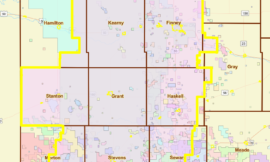Did you know that an overriding royalty interest (ORRI) or Non-Operated Working Interest can be terminated to wipe the slate clean so the operator can re-lease the same acreage without these burdens on the new lease? This situation is called a lease washout and we talk about what you should do to protect your interests as well as how it can impact mineral owners.
Be sure to also subscribe on Apple Podcasts via the link above and please leave us an honest rating and review. We read every one of them and sincerely appreciate any feedback you have. To ask us a question to be featured on an upcoming episode, please leave a comment below or send an email to feedback@mineralrightspodcast.com.
Oil and Gas Leasing 101
The leasehold interest grants the lessee the right to drill a well. If they drill a successful well then the owner of the majority of the oil and gas leases under that well becomes the operator. Their interest is called an operated Working Interest. Nowadays because multiple mineral tracts get pooled together to form a drilling unit there can be multiple companies or individuals who own the underlying oil and gas leases. The owners of the minority share of the oil and gas leases are called non-operated working interest owners. In other words, they are not responsible for the actual operation and maintenance of the wells on the lease they are just responsible for their proportional share of the cost of drilling and completing any wells that are drilled and if the well is successful, then for their share of the cost of operating and maintaining those wells and in exchange they receive their proportional share of the revenue from the sale of any hydrocarbons that are produced.
During the leasing process it is not uncommon for an overriding royalty interest to be granted to one or more parties (typically in exchange for work that is done, as with a landman that helped lease the acreage). These overriding royalty interests are non-cost bearing and similar to other royalty interests except for the fact they are carved out of the leasehold interest and not the mineral interest.. When the oil and gas lease terminates when the last well is plugged & abandoned on that lease, any overriding royalties terminate as well.
So the important thing to remember is that as a general rule, the non-operated working interests and overriding royalty interests are tied to the underlying oil and gas leases and when the leases terminate, the non op interests and overrides terminate as well.
The concept of a lease washout is when an operator releases (let’s go of) or when they allow an existing oil & gas lease to expire in order to start from scratch without the financial burden of overriding royalty interests or unfavorable lease provisions that were part of the original lease.
What is a Lease Washout?
A lease washout occurs when an oil and gas lease is intentionally allowed to expire by plugging any remaining oil and gas wells that are holding the leases in question. An operator may seek to washout an existing oil and gas lease in order to extinguish Overriding Royalty Interests (ORRI’s) or minority non-operated working interests in a lease that is held by production so they can obtain new leases with an overall higher lease Net Revenue Interest (NRI). In theory, these new terms will help improve the economics for any new wells that are drilled because they will be able to keep a larger share of the revenue generated from the sale of any hydrocarbons since they won’t have to pay the overriding royalty interest owners, for example.
When are you at Risk of a Lease Washout?
Mineral owners may be hearing this and get concerned that their operator will arbitrarily have the ability to extinguish their lease if the terms are unfavorable. Don’t worry, if you have wells that are producing in commercial quantities you generally should not have anything to worry about. They can’t cancel a lease and attempt to obtain a new lease with more favorable terms to them if the lease is held by production. Generally it would be unfavorable if they spent the money to plug and abandon the existing wells and then would have to spend millions of dollars to obtain new leases and drill new wells. Financial incentives are going to direct them to make the decision that results in the highest economic value, which is usually continuing to operate the existing wells.
That said, if you have wells that are at the end of their economic life and maybe aren’t producing oil & gas in commercial quantities anymore, it may be in the best interest for the operator to plug & abandon the existing wells in order to stop losing money by operating unprofitably.
If you are in an area with a lot of horizontal drilling in maybe deeper formations, it is possible that you will get approached to lease your minerals again by that company or a different one entirely and you would benefit from a new lease bonus and hopefully if horizontal wells get drilled then you get the benefit of future royalties as well.
How to Prevent a Lease Washout
One common strategy to minimize the likelihood of allowing a lease washout (depending on the state) is to include anti-washout provisions in the lease assignment document.
Here is an example of anti-washout language:
The overriding royalty interest hereby assigned in a Lease shall be applicable and attach to all extensions, modifications, ratifications, amendments, renewals, top leases and/or new leases of such lease covering all or any portion of the lands and interests which are included in such lease as of the Effective Date, taken, contracted for or acquired by Assignor or an Affiliate of Assignor while such lease is in effect or within a period of one (1) year after the expiration or termination of such lease.
Example Anti-Washout Language
The usefulness of these anti-washout provisions depend greatly on the state.
Lease Washouts in Texas
Unfortunately for the ORRI and non-op WI owners in Texas, it is perfectly legal for operators to intentionally washout lease burdens such as ORRI’s or WI’s because the courts have said that no fiduciary duty exists between the operator and the other minority interest owners.
That is one of the reasons that Texas House Bill 450 was passed in 2023 to at least provide a clear recourse for affected overriding royalty owners whose interests are extinguished due to a bad faith washout.
Lease Washouts in Oklahoma
The “Oklahoma rule” establishes that the presence of an “extension or renewal” clause in an assignment creating an overriding royalty interest creates a fiduciary duty between the parties involved. This rule was established in the case of Probst v. Hughes and has been followed in subsequent cases. The rule applies even if there are variances between the old and new lease terms, as long as the “extension or renewal” clause is present and the overriding royalty interest was an important part of the consideration received in the assignment.
Joint Operating Agreements
For non-operated working interest owners, you have more options. The Joint Operating Agreement (JOA) is the document that governs the rights and responsibilities of the operator and non-operating partners. It may include anti-washout provisions.
If the operator proposes to plug and abandon (p&A) wells, the lease will terminate when those wells are plugged. You will receive an Authorization for Expenditure (AFE) with the estimated cost of plugging and abandonment, as well as your share. If you object, your only recourse may be to take over the operation of the wells.
The JOA may also require you to compensate the operator and other non-operating partners for the value of the equipment and well, among other things.
Conclusion
A lease washout occurs when an oil and gas lease is intentionally allowed to expire by plugging the remaining wells. This is done to extinguish overriding royalty interests or minority non-operated working interests in order to obtain new leases with more favorable terms. The risk of a lease washout is generally low if the lease is held by production. Anti-washout provisions can be included in lease assignment documents to minimize the likelihood of a washout. In Texas, operators can legally washout lease burdens, while in Oklahoma, the presence of an “extension or renewal” clause establishes a fiduciary duty. Joint Operating Agreements may also include anti-washout provisions for non-operated working interest owners.
Resources Mentioned in this Episode
- Bill Text: TX HB450 | 2023-2024 | 88th Legislature | Enrolled | LegiScan New Texas law concerning bad faith washout of ORRI’s
- Lease Washouts
- Oil & Gas E-Report – Issue 4, December 2022
- OVERRIDING ROYALTY INTERESTS: PITFALLS, PRECEDENT, AND PROTECTION
- MRP 6: How to Negotiate an Oil and Gas Lease
Thanks for Listening!
To share your thoughts:
- Leave a comment or question below (we read each one and your question may be featured in a future episode)!
- Ask a question or leave us feedback via email.
To help out the show:
Click the Apple Podcasts Logo Above to leave us a rating & review. It really helps us reach those that need to hear this information and only takes a minute. We greatly appreciate it! Plus, you can get a shout out on a future episode!
Thanks again – until next time!




